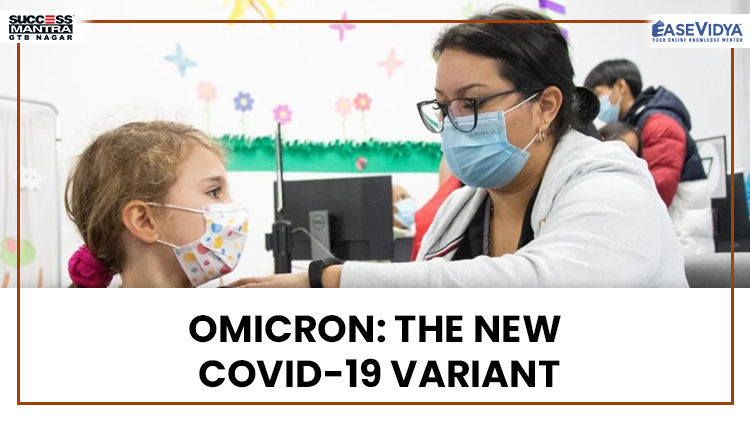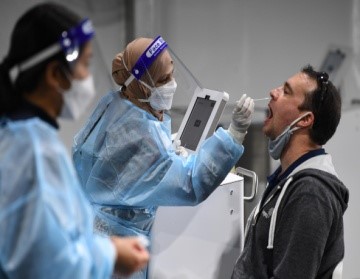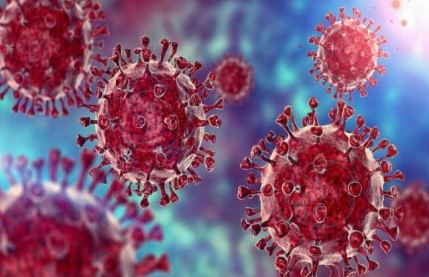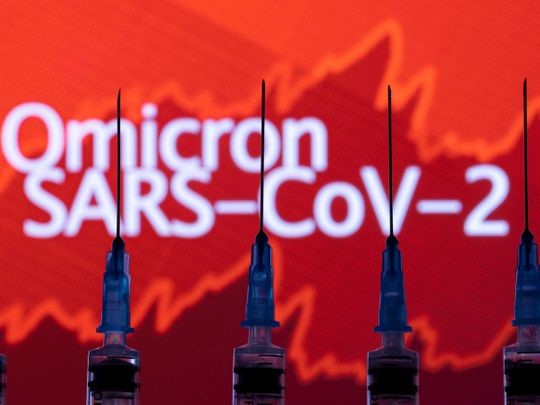
OMICRON:THE NEW COVID-19 VARIANT
OMICRON: THE NEW COVID-19 VARIANT
Omicron, the new COVID variant, was designated as a variant of concern by the World Health Organization on November 26, 2021 upon the advice of the WHO Technical Advisory Group on SARS-CoV-2 Virus due to its concerning mutations. The variant, first reported in South Africa, has reportedly undergone more mutations to the ‘spike protein’ than the existing variants and it also raises questions on the efficacy of the vaccine. Researchers around the world are conducting studies to understand more aspects of Omicron. The virus was first detected in Southern Africa and it is renamed Omicron.

Current Affairs Notes By Success Mantra Coaching Institute GTB Nagar Delhi CLICK HERE
ABOUT THE NEW VARIANT 'OMICRON'
Omicron is placed in the most-troubling category of Covid-19 variants, along with the globally-dominant Delta plus its weaker rivals Alpha, Beta and Gamma. This variant has a large number of mutations. Some of them are cause for serious concern because they may allow the new variant to evade immunity obtained from a past infection or via a vaccine. However, there are no reliable estimates of just how much more transmissible the Omicron variant is compared to previous strains of the virus. Apart from South Africa, Omicron has been detected in Israel in people coming from Malawi, Botswana, Belgium and Hong Kong.
Nomenclature: The WHO has decided to name the variants after the letters of the Greek alphabet, to avoid the countries that first detected them being stigmatised. WHO selected the name Omicron, instead of Nu or Xi, the two letters between Mu and Omicron. This is because: Xi happens to be a popular surname in China (avoiding ‘causing offence to any cultural, social, national, regional, professional or ethnic groups). Nu could have been confused with the word ‘new’.
WHY IS THE NEW COVID VARIANT CONCERNING?
The new COVID variant Omicron reportedly has over 30 mutations on its spike protein, which is used by the virus to unlock our body’s cells. This is almost double than the number of mutations carried by the Delta variant, which caused havoc across the world earlier this year. The variant's high mutation capability has raised concerns that the antibodies from previous infections may not be enough to fight off this new variant. This means that the virus is more likely to cause reinfections. As per WHO, it is not yet clear whether Omicron can more easily spread from person to person compared to other variants, including Delta. While the number of positive cases has risen in areas of South Africa affected by this variant, studies are underway to understand if it is because of Omicron or other factors.

Situation in India: Seroprevalence studies indicate that a large proportion of the population has already been exposed to the virus providing some level of protection to subsequent infections.
Further, the immunisation campaign has gained momentum. Approximately 44% of Indian adults have been fully vaccinated and 82% have received at least one dose.
VARIANTS OF CONCERN
A variant for which there is evidence of an increase in transmissibility, more severe disease (e.g., increased hospitalizations or deaths), significant reduction in neutralization by antibodies generated during previous infection or vaccination, reduced effectiveness of treatments or vaccines, or diagnostic detection failures. The new Variants could kick off new wave(s) of epidemic transmission.
The WHO currently lists 5 variants of concern:
- Omicron (B.1.1.529), identified in southern Africa in November 2021
- Delta (B.1.617.2), which emerged in India in late 2020 and spread around the world
- Gamma (P.1), which emerged in Brazil in late 2020
- Beta (B.1.351), which emerged in South Africa in early 2020
- Alpha (B.1.1.7), which merged in Britain in late 2020.
VARIANTS OF INTEREST
A variant with specific genetic markers that have been associated with changes to receptor binding, reduced neutralization by antibodies generated against previous infection or vaccination, reduced efficacy of treatments, potential diagnostic impact, or predicted increase in transmissibility or disease severity. There are currently two: Mu (B.1.621), which emerged in Colombia in early 2021, Lambda (C.37), which emerged in Peru in late 2020
Mutation, Variant and Strain: When a virus replicates it doesn’t always manage to produce an exact copy of itself. This means that, over time, the virus may start to differ slightly in terms of its genetic sequence. Any changes to the viral genetic sequence during this process is known as a Mutation. Viruses with new mutations are sometimes called Variants. Variants can differ by one or multiple mutations. When a new variant has different functional properties to the original virus and becomes established in a population, it is sometimes referred to as a New Strain of the virus. All strains are variants, but not all variants are strains.
WORLD HEALTH ORGANIZATIONS (WHO)
World Health Organization (WHO), the United Nations’ specialized agency for Health was founded in 1948. Its headquarters are situated in Geneva, Switzerland. There are 194 Member States, 150 country offices, six regional offices. It is an intergovernmental organization and works in collaboration with its member states usually through the Ministries of Health. The WHO provides leadership on global health matters, shaping the health research agenda, setting norms and standards, articulating evidence-based policy options, providing technical support to countries and monitoring and assessing health trends. It began functioning on April 7, 1948 – a date now being celebrated every year as World Health Day.

Objectives: To act as the directing and coordinating authority on international health work.
To establish and maintain effective collaboration with the United Nations, specialized agencies, governmental health administrations, professional groups and such other organizations as may be deemed appropriate. To provide assistance to the Governments, upon request, in strengthening health services. To promote cooperation among scientific and professional groups which contribute to the advancement of health.
CONCLUSION
- Scientific approach to Travel Ban: India should take a risk-based and scientific approach when considering travel curbs in light of the variant.
- Reinforcing Public Health Measures: New emerging variants signify public health measures are still important. For example, distancing, mask-wearing, avoiding crowded spaces, and good ventilation.
- Lesson Learnt: An important lesson the pandemic has taught us in India is the critical importance of biomedical research and capacity building – for saving lives and economic growth.
PRAVAHINI Current Affairs Notes By Success Mantra Coaching Institute GTB Nagar Delhi CLICK HERE
TEST YOURSELF
Q.1 Recently, which of the following is the new COVID variant designated as a variant of concern by the World Health Organization on November 26, 2021?
- Lambda Variant
- Omicron Variant: ANSWER
- Delta Plus Variant
- None of the above
Q.2 Consider the given statements & state which of gh following is/are incorrect in the reference to the Delta Plus Variant in India?
- Delta plus (B.1.617.2.1/(AY.1) is a new variant of the SARS-CoV-2 coronavirus formed due to a mutation in the Delta strain of the virus.
- It is technically the next generation of SARS-COV-2.
- This mutant of Delta known as 'Delta plus Variant' was first detected in Africa & South America especially Brazil in March 2021: ANSWER
- None of the following
Q.3 The B.1.617.1 and B.1.617.2 COVID-19 variants that were first identified in India, have been named as ____________ respectively by the World Health Organization?
- SARS-CoV-2 Alpha variant & Delta Variant
- Zeta & Lambda Variant
- Lambda & SARS-CoV-2 Alpha variant
- Kappa & Delta Variant: ANSWER
Q.4 Consider the given statements & state which of the following is/are correct in the reference to the above mentioned passage?
- Variants of a virus have one or more mutations that differentiate it from the other variants that are in circulation. While most mutations are deleterious for the virus, some make it easier for the virus to survive.
- Indian SARS-CoV-2 Consortium on Genomics (INSACOG) is a multi-laboratory, multi-agency, pan-India network to monitor genomic variations in the SARS-CoV-2.
- Only I follows
- Only II follows
- Both I & II follows: ANSWER
- None of the above
Q.5 With the reference to the World Health Organization, consider the given statements & state which of the following is/are correct?
- World Health Organization (WHO) is the United Nations’ specialized agency for Health was founded in 1945.
- It is an intergovernmental organization and works in collaboration with its member states usually through the Ministries of Health.
- The headquarters of the World Health Organization is situated in Geneva, Switzerland: ANSWER
- None of the following













0 Comment